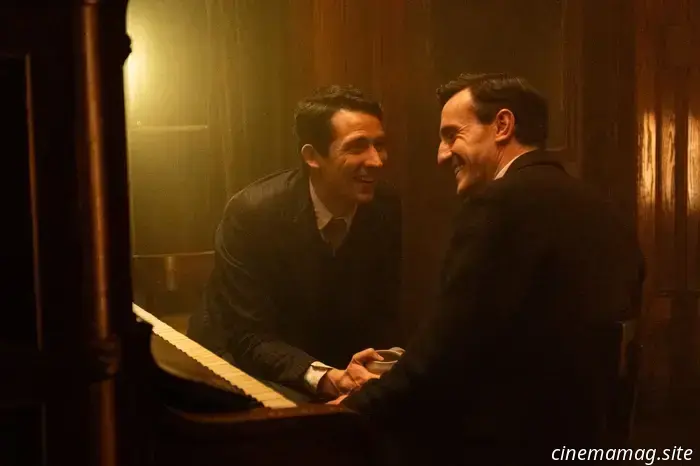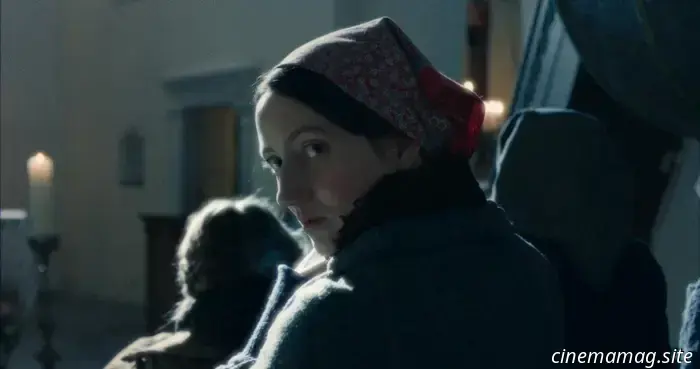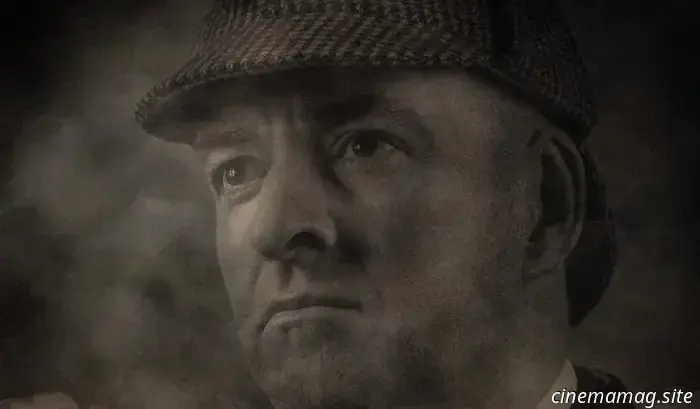
Cannes Review: The History of Sound is a Drama Graced with Tender Emotion and Terence Davies-Inspired Musicality.
It's unusual to hear Appalachian fiddle folk music in a French theater, directed by a South African filmmaker, portraying the tender, song-collecting romance of two American men deeply in love, played by British actors. Thanks to Paul Mescal, the result is quite beautiful.
The History of Sound, directed by Oliver Hermanus and adapted by Ben Shattuck from his short-story collection of the same name, is a quietly moving tribute to New England’s folk history. This drama, filled with whisper and sadness, is likely to elicit tears from anyone touched by a remarkable homegrown voice or a poignant romance. Its varied styles and vocal ranges hint at the subtle emergence of a lesser-known American sound.
Similar to Inside Llewyn Davis and O Brother, Where Art Thou?, which aimed to reintroduce music the Coens believed would resonate with contemporary audiences, The History of Sound seeks to highlight the power of folk songs, primarily performed a cappella, from their era. T Bone Burnett would surely approve.
Hermanus’ approach draws upon the familiar emotional landscape of Brokeback Mountain, a film so impactful that it has inspired numerous iterations, nearly normalizing Ang Lee’s distinctive style over the past twenty years. However, The History of Sound manages to bring something new to the table. Where Lee depicted a small but representative part of the closeted American West in the '60s and '70s, Hermanus focuses on New England in the aftermath of World War I.
Lionel (Mescal) and David (Josh O’Connor) meet at Boston College in 1917 and quickly fall in love, though their feelings remain largely unrecognized by those around them. They come across as merely close friends, with Lionel appearing quiet and expressionless, wearing a faint smile. People might think he is emotionally vacant—until he sings. In contrast, David is energetic and charming, almost as if he could have been a con artist in another life; in this one, his passion lies in music.
Soon after their initial connection, David is drafted into the army, while Lionel returns home to care for his strict yet loving mother, who has never stepped beyond their Massachusetts farm. She is shocked when Lionel reveals a year later that he plans to leave for an indefinite journey collecting songs with David, funded by the university’s research program.
In 1919, with the war over and spirits high, their reunion is filled with promise. Using the recently invented Edison wax cylinder phonograph, they embark on a journey through the Northeast to record local folk songs and dialects. Armed only with camping supplies and recording gear, their expedition unfolds swiftly but peacefully—though the film is devoid of explicit intimacy. The time spent immersed in the gentle, heartfelt music rushes by, endowing the scenes with a treasured quality. Unfortunately, the longer stretches without music can feel drawn-out in contrast, often reliant on the promise of an emerging song rather than substantial dialogue. Lionel eventually relocates abroad to pursue a life as a singer and briefly seems to genuinely fall for a woman. Yet, in a gay romance narrative, this outcome feels inevitably doomed.
Whether The History of Sound merits another viewing for its heart-wrenching romance is debatable—it undeniably deepens the story’s emotional weight but can also make it a substantial emotional burden. However, I eagerly await the chance to revisit its songs, both audibly and visually; the auditory experience speaks volumes. There’s something about being present with the performers while they sing that halts the world, a quality in the music that uplifts the spirit with its unique, melancholic force.
The frequent tavern or kitchen-set song evokes Terence Davies’ work, highlighting the old-world charm of communal singing—whether for enjoyment, shared mourning, or any reason that justified music’s sweet resonance. In an era before music became effortlessly accessible, hearing a new type of song, voice, or instrument was a profound experience.
This remains true today, provided the setting is right. We encounter various music types but often choose to ignore them at will; for previous generations, engagement was more limited. The ability to record sound, and especially music that could be replayed, instilled a sense of wonder. Their journey from Massachusetts to Maine—a vital site for the Lewis and Clark of American folk dialects—reveals the intriguing reactions of those they approached with their project. The advent of recording technology feels almost magical to people of that time, who interact with the phonograph and recording sessions with trepidation.
Much like in Davies’ films, the sudden influx of a cappella folk songs transports listeners from the present, shedding light on why this experience was so impactful. Mescal is perfectly cast in this regard; his singing voice is a tender croon that is both beautiful and authentic (one can’t help but recall Mescal's collaborations with Phoebe Bridgers). It’s refreshing to see him out of the blockbuster cycle that often underutilizes his subtle abilities
Other articles
 NYC Weekend Preview: Ran, Prime Cut, Police Story, and More
NYC Weekend Watch is our weekly summary of repertory screenings. IFC Center is showcasing a 40th-anniversary restoration of Ran; Goodfellas and Withnail and I are shown daily; Wanda is scheduled for Friday and Sunday, while Children of Men will be screened on Friday; late showings include To Live and Die in L.A., Brain Damage, In the Realm of the Senses, and Liquid Sky. Roxy Cinema is presenting Paranormal Activity on 35mm this week.
NYC Weekend Preview: Ran, Prime Cut, Police Story, and More
NYC Weekend Watch is our weekly summary of repertory screenings. IFC Center is showcasing a 40th-anniversary restoration of Ran; Goodfellas and Withnail and I are shown daily; Wanda is scheduled for Friday and Sunday, while Children of Men will be screened on Friday; late showings include To Live and Die in L.A., Brain Damage, In the Realm of the Senses, and Liquid Sky. Roxy Cinema is presenting Paranormal Activity on 35mm this week.
 Mighty Morphin Power Rangers: Rita's Rewind comic tie-in set to be released in August.
Boom! Studios has revealed that the side-scrolling beat ’em up video game Mighty Morphin Power Rangers: Rita’s Rewind will be accompanied by a comic book tie-in. Writer Zoe Tunnell (Godzilla: Valentine’s Day Special) and artist Tango (Teenage Mutant Ninja Turtles: Saturday Morning Adventures) will collaborate on a one-shot comic of the same title. Rita Repulsa has teamed [...]
Mighty Morphin Power Rangers: Rita's Rewind comic tie-in set to be released in August.
Boom! Studios has revealed that the side-scrolling beat ’em up video game Mighty Morphin Power Rangers: Rita’s Rewind will be accompanied by a comic book tie-in. Writer Zoe Tunnell (Godzilla: Valentine’s Day Special) and artist Tango (Teenage Mutant Ninja Turtles: Saturday Morning Adventures) will collaborate on a one-shot comic of the same title. Rita Repulsa has teamed [...]
 Debuting on Streaming: Vermiglio, Mickey 17, The Legend of Ochi, The Black Sea, and More
Every week, we showcase the significant titles that have recently become available on streaming platforms in the United States. Take a look at this week's picks below and explore previous compilations here. The Black Sea (Crystal Moselle and Derrick B. Harden) Throughout much of its duration, Crystal Moselle and Derrick B. Harden’s documentary-style hybrid The Black Sea balances on the brink of
Debuting on Streaming: Vermiglio, Mickey 17, The Legend of Ochi, The Black Sea, and More
Every week, we showcase the significant titles that have recently become available on streaming platforms in the United States. Take a look at this week's picks below and explore previous compilations here. The Black Sea (Crystal Moselle and Derrick B. Harden) Throughout much of its duration, Crystal Moselle and Derrick B. Harden’s documentary-style hybrid The Black Sea balances on the brink of
 Cannes Review: Sentimental Value Flourishes Through the Unique Chemistry of Joachim Trier and Renate Reinsve
Through a carefully crafted montage reminiscent of Mike Mills, we explore the personal history of Nora Berg (Renate Reinsve), encapsulating around 30 years of an Oslo native's life through select key moments, emotions, and reflections, intertwined with the lives and traits of those who came before her. A grandmother's wise voice guides us into "Sentimental Value," a film by Joachim Trier.
Cannes Review: Sentimental Value Flourishes Through the Unique Chemistry of Joachim Trier and Renate Reinsve
Through a carefully crafted montage reminiscent of Mike Mills, we explore the personal history of Nora Berg (Renate Reinsve), encapsulating around 30 years of an Oslo native's life through select key moments, emotions, and reflections, intertwined with the lives and traits of those who came before her. A grandmother's wise voice guides us into "Sentimental Value," a film by Joachim Trier.
 The Ten Commandments of '80s Films
Here are the 10 Commandments of '80s films, featuring Honor Thy Father and Mother Even If They Are Not as Intelligent as You.
The Ten Commandments of '80s Films
Here are the 10 Commandments of '80s films, featuring Honor Thy Father and Mother Even If They Are Not as Intelligent as You.
 Sherlock Holmes Untold will be released in October by Big Finish.
Big Finish has revealed that a brand-new audio drama series featuring Sherlock Holmes will be released this October. The upcoming Sherlock Holmes Untold will showcase Sir Arthur Conan Doyle’s brilliant detective tackling fresh obstacles and formidable foes. This new series will consist of eight half-hour episodes, released as downloadable installments each week.
Sherlock Holmes Untold will be released in October by Big Finish.
Big Finish has revealed that a brand-new audio drama series featuring Sherlock Holmes will be released this October. The upcoming Sherlock Holmes Untold will showcase Sir Arthur Conan Doyle’s brilliant detective tackling fresh obstacles and formidable foes. This new series will consist of eight half-hour episodes, released as downloadable installments each week.
Cannes Review: The History of Sound is a Drama Graced with Tender Emotion and Terence Davies-Inspired Musicality.
It's unusual to experience Appalachian fiddle folk music in a French theater through the vision of a South African director, depicting the queer, song-gathering lives of two American men who are deeply and tenderly in love, portrayed by British actors. With the contribution of Paul Mescal, it turns out to be quite beautiful. The History of Sound––a subtle tribute by Oliver Hermanus.
